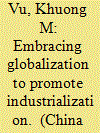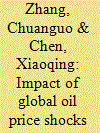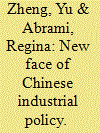| Srl | Item |
| 1 |
ID:
161815


|
|
|
|
|
| Summary/Abstract |
Debates about industrial policy reveal disagreements on three salient issues. The first is whether government can overcome its own failures, namely knowledge constraints and rent-seeking, to correct market failures. The second is whether government should go beyond horizontal policies to adopt more activist interventions such as “winner-picking.” The third is whether intervention should follow or defy the country's comparative advantage. Singapore's experience in developing a globally competitive petrochemicals industry, within only a few decades and through vigorous interventions, provides meaningful insights into these debates and offers valuable lessons for developing countries. The lessons drawn from this paper suggest three fundamental principles for designing a promotion strategy and a strategic action framework for implementation.
|
|
|
|
|
|
|
|
|
|
|
|
|
|
|
|
| 2 |
ID:
127868


|
|
|
|
|
| Publication |
2014.
|
| Summary/Abstract |
This paper investigated the reaction of aggregate commodity market to oil price shocks and also explored the effects of oil price shocks on China's fundamental industries: metals, petrochemicals, grains and oilfats. We separated the volatilities of oil price into expected, unexpected and negatively expected categories to identify how oil prices influence bulk commodity markets. We contrasted the results between different periods and among classified indices, in order to discover the significant changes in recent years and the differences at an industry level. Our results indicate that the aggregate commodity market was affected by both expected and unexpected oil price volatilities in China. The impact of unexpected oil price volatilities became more complex after 2007. The metals and grains indices did not significantly respond to the expected volatility in oil prices, in contrast to the petrochemicals and oilfats indices. These results not only contribute to advancing the existing literature, but also merit particular attention from policy makers and market investors in China.
|
|
|
|
|
|
|
|
|
|
|
|
|
|
|
|
| 3 |
ID:
108354


|
|
|
|
|
| Publication |
2011.
|
| Summary/Abstract |
Why have China's petrochemical and steel industries behaved so differently in seeking trade protection through antidumping measures, especially given that both industries face the full force of the global economy? We argue that the patterning of antidumping actions is best explained in terms of industrial structures, inclusive of degrees of horizontal concentration and vertical integration. These structures determine a firm's motivation to seek protection as well as its capacity to overcome collective action problems within its industry. In the petro-chemical industry, the shift toward greater horizontal consolidation and vertical integration reduces the collective action problems associated with antidumping petitions among upstream companies. It also weakens downstream companies lobbying in favor of the general protection of highly integrated conglomerates. In the steel industry, by contrast, national industrial policy fails to weaken local state interests sufficiently. Fragmented upstream and downstream channels instead persist, with strong odds against upstream suppliers waging a successful defense of material interests. Such distinctive industrial structures, we show, were a direct result of whether the central government could restructure these designated priority industries in its preferred direction. We find that exogenous price shocks proved particularly helpful in this regard.
|
|
|
|
|
|
|
|
|
|
|
|
|
|
|
|
| 4 |
ID:
179701


|
|
|
|
|
| Summary/Abstract |
The continued expansion of plastics production all over the world entrenches modern societies and life styles deeper in the dependence on fossil resources. This research note develops the main aspects of the carbon lock-in in the plastics industry and how it extends into many aspects of contemporary life. With data collected from trade press and reports, we present insights of the investment trends in the plastics industry from the past decade. We show that among the twelve largest companies 88 new projects for production capacity increase and infrastructure expansion were announced between 2012 and 2019. We connect this increasing infrastructural lock-in to actions and strategies enacted by the industry to restrict regulations on the use of plastics and support specific consumer behaviour to uphold also an institutional and behavioural lock-in. The paper outlines the need for more extensive research on the plastics and petrochemical sectors, especially regarding data from Asian companies and activities in China in particular. We also point to areas of grave concern for new policy, aiming to reduce the high growth rate for the volumes of oil and gas that feed the industry as the current focus on plastic waste collection and recycling is insufficient.
|
|
|
|
|
|
|
|
|
|
|
|
|
|
|
|